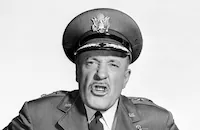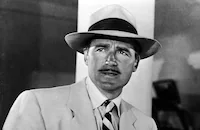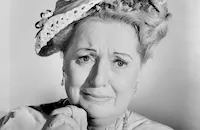Auntie Mame

Brief Synopsis
Cast & Crew
Morton Dacosta
Rosalind Russell
Forrest Tucker
Coral Browne
Fred Clark
Roger Smith
Film Details
Technical Specs

Synopsis
In 1928, Edwin Dennis completes his last will and testament stating that, upon his death, his only son Patrick will be reared by his sister, Mame Dennis, under the conservative eye of banker Dwight Babcock. The day after the will is signed, Dennis drops dead and his faithful Irish servant, Norah Muldoon, takes the young Patrick from Chicago to Mame's residence at 3 Beekman Place, New York City. They arrive during a party, in which the flamboyant Mame is graciously entertaining with breezy charm and bootlegged alcohol. Among the Bohemian guests are a man and his monkey, the headmaster of a nudist school, a composer and his wife, artists of all kinds, someone who looks like Gertrude Stein and a non-English-speaking Orthodox Lithuanian bishop. Upon realizing that Patrick is her nephew, Mame invites him to join the party and he hungrily eats caviar, which he calls "fishberry jam." Afterward, Mame instructs Patrick to write down all the words he heard that he did not understand and promises that she will "open doors" that he "never dreamed existed." Two weeks and thirteen cocktail parties later, Norah and Patrick have settled into the eccentric household with Mame's houseboy, Ito, her best friend, actress Vera Charles, who sleeps off hangovers in one of Mame's extra rooms, and Mame's boyfriend, publisher Lindsay Woolsey, who also visits frequently. When Babcock arrives to check on Patrick, the well-mannered boy skillfully mixes him a martini. Babcock wants to enroll Patrick in an "exclusive and restricted" boys' school and Mame pretends to agree. Later, when Babcock learns that Patrick is enrolled at Acacius Page's experimental school in Greenwich Village, he insists on sending the boy to a boarding school, breaking the hearts of both Mame and Patrick, who have grown close. In the stock market crash of 1929, Mame loses her fortune and then breaks off with Lindsay, because she refuses to marry for security. Needing a job, she takes a small role in Vera's new play, but, unable to be inconspicuous in her tiny role, Mame ad-libs, jangles her jewelry and catches her bracelets on Vera's costume during the play's New Haven tryouts, turning the drama into comedy. Only Patrick is impressed with her performance and she is soon looking for another job. After failing as a switchboard operator, Mame takes a job as a sales clerk at Macy's department store during the pre-Christmas season. That job, too, is short-lived, because Mame can only write sales slips that are "Cash On Delivery." With no money coming in, Mame's close-knit household struggles to have a meaningful, if meager, Christmas. Norah, who finds Mame "odd, but lovin'", and Ito have stayed on without being paid and settle the butcher's bill with their own savings as a Christmas present. Soon after, oil millionaire Beauregard Jackson Pickett Burnside knocks on the door, after having seen Mame at Macy's and consequently searching the city for her. He invites them out to dinner, and later, to his Georgia plantation. Although Beauregard is captivated by Mame, his family is not, and Sally Cato McDougal, a neighbor who has failed to capture Beauregard's heart, tries to sabotage their blooming relationship. When Mame, to please Beauregard, claims untruthfully that she can ride a horse, Sally arranges a foxhunt and gives Mame an untrainable horse to ride. Although Mame has difficulty controlling the horse, at the end of the hunt, she is holding the exhausted fox and the impressed Beauregard proposes to her in front of everyone. For their honeymoon, the newlyweds embark on an extended world tour, and Patrick, now a university student, joins them during holidays. While skiing the Matterhorn, Beauregard, who is a camera buff, falls over a cliff to his death while taking a picture and the grieving Mame continues traveling alone, revisiting the places she and Beauregard had been. When she eventually returns to Beekman Place, Patrick, believing Mame needs a project, has arranged for her to write her memoirs, which Lindsay will publish. To assist Mame, Patrick hires a stenographer, timid and frumpy Agnes Gooch, to take dictation and an Irish poet, Brian O'Bannion, to serve as her editor. For the next few months, Mame dictates to Agnes, and O'Bannion lives well and does little. Unexpectedly one day, Patrick arrives, wanting Mame to meet his girl friend, Gloria Upson. Claiming that Gloria is from "good conservative stock," Patrick admits that he is ashamed of Mame's "peculiarities" and begs her to act normal when Gloria visits. Sadly, Mame realizes that Patrick has become a product of Babcock's choice of schooling: "beastly," "bourgeois" and a "snob." Although Patrick has embraced the opposite of everything she believes in, Mame loves him deeply and says she will do anything for him. As Patrick is to arrive with Gloria within the hour, Mame breaks a date to attend a party with O'Bannion and dresses up Agnes to escort him. To calm Agnes, Mame gives her a whiskey, which the frightened woman is unused to drinking, and, for courage, tells her the motto by which she lives: "Life is a banquet and most poor suckers are starving to death." When Patrick and the spoiled and shallow Gloria arrive, they tell Mame that they are already engaged. Agnes returns the next day, alone and remembering little of her adventure. Soon, Mame journeys to Connecticut to meet Gloria's family, the bigoted and gauche Claude and Doris Upson. The Upsons have planned the children's wedding, decided on Patrick's career and even ask Mame to pay for half of the cost of property adjacent to theirs for a wedding present. Mame learns that the Upsons have a double motive for choosing that particular wedding gift, as they wish to prevent a Jewish man from buying the property and moving into the neighborhood. While secretly abhorring the Upsons, Mame offers to have them come to Beekman Place for an "intimate family dinner" in the near future. A few months later, final preparations are being made for the dinner. Patrick is horrified to find Agnes several months pregnant by O'Bannion, who has not been seen since the night of the party. Patrick insists that she must go upstairs when the Upsons arrive. Upon meeting Mame's new secretary, Pegeen Ryan, who is hanging an odd-looking sculpture in Mame's newly redecorated foyer, Patrick jokes and temporarily regains his former, unpretentious charm. When Gloria, the Upsons and Babcock arrive, Mame directs them to sit in her new, avant-garde seating area that can be raised and lowered by the push of a button. For hors d'oeurves, she serves pickled rattlesnake and a flaming beverage in a martini glass, bewildering her guests as to how to drink it. Agnes waddles down to take a calcium pill, and then cries when Doris asks about her "husband." After Acacius, Vera and Lindsay arrive, Mame passes out chapters from the galleys of her book for all to read. At first Patrick is embarrassed, but soon begins to reminisce. Mistaking Pegeen for Patrick's intended, Vera toasts them. Gloria, wanting attention, tells a meaningless story that embarrasses everyone but her parents. The Upsons are shocked when Vera points out that Mame's book will be the "raciest" of the year, but are even more scandalized when they learn that Agnes is unwed. When a telegram from O'Bannion arrives, demanding money and claiming that he and Agnes are married, Mame congratulates the relieved Agnes. Offended, Gloria expresses her disapproval of Patrick's family and after Patrick calls her selfish and empty headed, she breaks off their engagement. Mame then announces that she is donating money to build a home for refugee children on the lot next to the Upsons'. Infuriated, the Upsons inadvertently cause their seats to elevate, and after disentangling themselves, leave in a huff. Babcock berates Mame for ruining his carefully laid plans for Patrick, but Mame says she could not watch her nephew be "shut in a safe-deposit box." Patrick simply thanks her and, years later, watches with his wife Pegeen as Mame lures their entranced son Michael through "open doors" he "never dreamed existed."

Director
Morton Dacosta
Cast

Rosalind Russell

Forrest Tucker

Coral Browne

Fred Clark

Roger Smith

Patric Knowles
Peggy Cass
Jan Handzlik

Joanna Barnes
Pippa Scott

Lee Patrick
Willard Waterman
Robin Hughes

Connie Gilchrist
Yuki Shimoda
Brook Byron

Carol Veazie

Henry Brandon
Larry Rio
Saundra Edwards
Michael Harris
Bob Crawley
Colin Kenny
Rand Harper

Gregory Gay
Gladys Roach
Booth Colman
Charles Heard
Jack Daly
Paul Davis

Olive Blakeney

Margaret Dumont
Owen Mcgiveney
Robert Gates
Mark Dana
Dick Reeves

Barbara Pepper
Chris Alexander
Ruth Warren
Butch Hengen
Daniel Meyers
Royden Clark
Dick Hudkins
Cajan Lee
Dub Taylor
Evelyn Ceder
Max Cutler
Louise Lane
Hazel Shermet
Doye O'dell
John Caler
Tom Mcdonough
Terry Kelman
Peter Bourne
Crew
Gordon Bau
Malcolm Bert
Mike Colgan
Betty Comden
Delman
Bruce Flu
Adolph Green
Robert Hanley A.i.d.
Ray Heindorf
Gene Hibbs
George James Hopkins
Bronislau Kaper
Maximilian
Larry Meek
M. A. Merrick
Orry-kelly
Don Page
Myrl Stoltz
Harry Stradling Sr.
William Ziegler

Photo Collections
Videos
Movie Clip




Trailer
Hosted Intro
Film Details
Technical Specs

Award Nominations
Best Actress
Best Art Direction
Best Cinematography
Best Editing
Best Picture
Best Supporting Actress
Articles
Auntie Mame
Comden was born in Brooklyn in 1917, Green in the Bronx in 1915. The pair began their lifelong collaboration by performing together in nightclubs in 1944. They wrote the book and lyrics for many successful Broadway musicals including the Tony-winning Wonderful Town, a 1953 musical version of My Sister Eileen starring their good friend Russell, with music by Leonard Bernstein. Among the many MGM film hits on which Comden and Green collaborated are Good News (1947), On the Town (1950), Singin' in the Rain (1952), The Band Wagon (1953) and Bells Are Ringing (1960).
In addition to their writing accomplishments, Comden and Green have distinguished themselves as performers in concerts of their own work, TV specials and movies. Comden acted in Slaves of New York (1989) and Garbo Talks (1984) Ð playing Greta Garbo! GreenÕs film-acting credits include Simon (1980) and My Favorite Year (1982). A common misconception about the pair is that they are husband and wife; each has enjoyed happy marriages with others. Their mutual admiration has been well documented. In her 1995 autobiography Off Stage, Comden wrote, "The mythic character in my life, my partner Adolph Green, it seems to me must have sprung full-blown from his own head. There is no other head quite capable of having done the job. Only his head has the antic, manic imagination and offbeat creative erudite-plus childlike originality to conceive of such a person."
Producer/Director: Morton DaCosta
Screenplay: Betty Comden, Adolph Green, from the novel by Patrick Dennis and the play by Jerome Lawrence and Robert E. Lee
Production Design: Malcolm C. Bert
Cinematography: Harry Stradling Sr.
Costume Design: Orry-Kelly
Editing: William H. Ziegler
Original Music: Bronislau Kaper
Cast: Rosalind Russell (Mame Dennis), Forrest Tucker (Beauregard Burnside), Coral Browne (Vera Charles), Fred Clark (Mr. Babcock), Roger Smith (Patrick Dennis, older), Patric Knowles (Lindsay Woolsey), Peggy Cass (Agnes Gooch), Jan Handzlik (Patrick Dennis, younger), Joanna Barnes (Gloria Upson), Pippa Scott (Pegeen Ryan).
C-134m.
by Roger Fristoe

Auntie Mame
Quotes
Oh, Agnes! Here you've been taking my dictations for weeks and you haven't gotten the message of my book: live!- Auntie Mame
Live?- Agnes Gooch
Yes! Live! Life's a banquet and most poor suckers are starving to death!- Auntie Mame
This will calm you down.- Mame
Oh, no! Spirits do the most horrible thing to me. I'm not the same person!- Agnes Gooch
What's wrong with that?- Mame
Will it mix with Dr. Pepper?- Agnes Gooch
He'll love it! Drink!- Mame
Well, now, uh, read me all the words you don't understand.- Mame Dennis
Libido, inferiority complex, stinko, blotto, free love, bathtub gin, monkey glands, Karl Marx... is he one of the Marx Brothers?- Patrick Dennis
...Neurotic, heterosexual...- Patrick Dennis
Oh, my my my my, what an eager little mind.- Mame Dennis
You won't need some of these words for months and months.- Mame Dennis
Run along to Ito and tell him to bring me a light breakfast - black coffee and a side car. Oh, oh. And a cold towel for your Auntie Vera.- Auntie Mame
Is she in the guest room again?- Patrick Dennis
Since Sunday, dear. Now run along to Ito and hurry my tray, darling. Your Auntie needs fuel.- Auntie Mame
Trivia
'Roz Russell' broke her ankle in the first take of the scene where she comes flying down the stairs in the gown with the capri pants - shooting had to be delayed until she recovered.
Notes
The film begins with a red-gloved hand holding a kaleidoscope. The object is turned so that the audience appears to be looking through the eyepiece and the opening credits are superimposed over the patterns formed. Many scenes end with a theatrical-style black-out, in which a light is focused on the character "Mame" before the screen turns black. As noted in the Motion Picture Herald Prod Digest review, the film "provided a unique means of establishing time and plot progression" by showing a change in the style of Mame's Beekman Place apartment décor at the beginning of sequences. According to a June 1958 Los Angeles Examiner article, the set was decorated in six different styles: Chinese, 1920s Modern, a French style called Syrie Maugham period named for writer Somerset Maugham's wife, English, Danish Modern and East Indian. As discussed in a January 1959 Los Angeles Examiner article, the Danish Modern set featured sofas, chairs and tables that could be elevated and lowered. The furniture was used to comic effect in the sequence in which the "Upsons" visit Mame's apartment.
Edward Everett Tanner III wrote the novel on which the film and stage play was based under the pseudonym Patrick Dennis. After his birth in 1921 and early years in Chicago, Tanner lived as colorfully as his aunt. A bon vivant, critic and popular novelist in the style of Noël Coward, he was a popular figure in New York society. His many other works include a novel, Around the World with Auntie Mame, which continued his autobiographical adventures, and Little Me, the "memoirs" of a fictional actress Belle Poitrine, which was adapted by Neil Simon into a Broadway musical. According to modern biographies, he was a loving husband and affectionate father. Upon realizing he was homosexual, Tanner entered a sanitarium and submitted himself to shock treatments, but eventually left his wife. Modern sources state that, after battling alcoholism and dwindling finances, he later seemed to find contentment in a second career as butler for Ray Kroc, CEO of McDonald's, before dying in his mid-fifties in 1976.
As noted in the Variety review, risqué language and "gamier aspects" of Dennis' novel, which remained in the stage play, were "toned down" for the film and "suggested rather than stated." The Variety review mentioned that at least one scene written for the film was excised in the final editing.
Auntie Mame was first adapted for the stage and directed by Morton Da Costa, who later directed the film. Rosalind Russell, Peggy Cass and young January Handzlik reprised their Broadway roles in the film. Both Russell and Cass were nominated for an Academy Award for Best Actress and Best Supporting Actress, but lost, respectively, to Elizabeth Taylor in Cat on a Hot Tin Roof and Wendy Hiller in Separate Tables. The film was also nominated for Best Picture, Best Art Direction, Best Editing and Best Cinematography, but in all categories lost to the film Gigi (see entries below). Although his appearance in the film has not been confirmed, a June 1958 Hollywood Reporter news item adds Edgar Johnson to the cast. A modern source adds Gloria Holden to the cast.
In 1966, Angela Lansbury starred on Broadway in Mame, the Jerry Herman musical that was based on the Patrick Dennis novel. In 1974, Robert Preston, Beatrice Arthur and Lucille Ball as "Auntie Mame" starred in the Warner Bros. film version of the Herman musical. A September 2003 Daily Variety news item reported that the Dennis estate had been queried regarding film rights on behalf of director Spike Lee and actress-singer Queen Latifah. An online website dedicated to the actress Cher reported in April 2003 that she and director Rob Marshall had planned to make a version of Mame for television, but those plans never came to fruition. Although in 2004 the ABC-TV network announced a version of Mame to be produced by Barbra Streisand, no further information has been found on this production.

Miscellaneous Notes
Released in United States January 1990
Released in United States Winter December 1958
Shown at Palm Springs Film Festival January 10-14, 1990.
Released in USA on video.
Technirama
Released in United States January 1990 (Shown at Palm Springs Film Festival January 10-14, 1990.)
Released in United States Winter December 1958
















